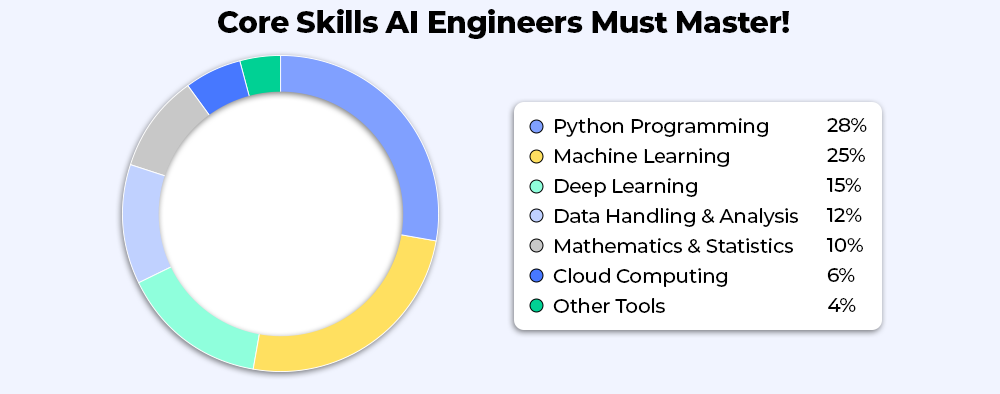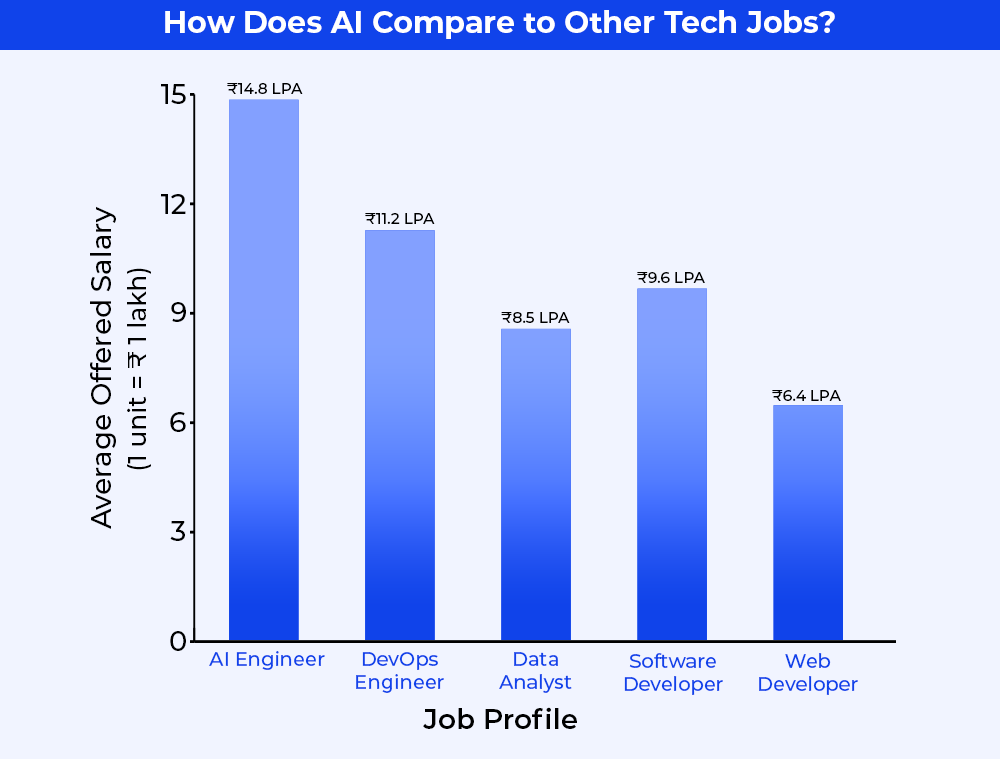Expert Interviews
- University Reviews
- Career Guide
 Video Counseling
Video CounselingImportant Facts
- Ask any Question - CV Forum

How to Know if Becoming an AI Engineer Is a Good Career Choice?
Priyanshu Bhatt Jan 22, 2026 1.1K Reads

Society is on the brink of a new era, characterized by automation, smart systems, and data-driven choices. Behind this revolution is Artificial Intelligence (AI) - a field that was envisioned as some purely science-fiction endeavor, yet one that is driving everything, including healthcare and finance, entertainment, and education. Having already infused artificial intelligence into our everyday lives via various technologies, such as virtual assistants, recommendation engines, facial recognition applications, and software, it should be no surprise that the profession of an AI Engineer is now considered one of the most lucrative and influential career options in the current job market.
Nevertheless, as much as the demand is high, there comes the important question: Should you choose to be an AI Engineer? Choosing a career in this field is not just about following trends. It needs critical participation of your interests, capabilities, long-term objectives, and desire to remain open to learning in a fast-changing field.
This blog will take you through all the aspects of what the engineers of AI do, what they require, where they work, how much an AI worker is paid, and how to evaluate whether this direction is what you want to choose or not. And now, let us get down to it.
What Exactly Does an AI Engineer Do?
Before you can figure out whether you are made to have a career in AI, it will be good to start by knowing what the job entails. A professional who designs, develops, and maintains a system that portrays an element of human intelligence is called an AI engineer. This involves activities like recognizing a pattern, understanding natural language, learning (by data), making decisions, and solving problems.
AI engineers never create apps or websites, unlike usual software developers: they deal with data models and algorithms as a priority. They attempt to train machines to get knowledge on the basis of huge amounts of data, to predict the outcome, to identify speech or pictures, and perform tasks that customarily need human intelligence. They must create smart systems that have limited contact with humans and can help them, including self-driving cars and voice assistants, as well as fraud and security prevention measures, and diagnostic solutions that can be adapted to a unique individual.
The practice in most organizations means that AI engineers work with data scientists, machine learning engineers, software developers, and business analysts to develop solutions that are both technically sound but also business-focused.

The Rising Demand for AI Professionals
The demand-supply difference in the technology employment sector has opened a huge gap as a result of the rate at which AI has increased in usage over the last few years. A report published by PwC stated that by 2030, AI will add more than 15 trillion dollars to the world economy and thereby become one of the largest economic disruptors ever. All kinds of businesses, both vertically and horizontally, are spending a lot of resources to implement AI, and they require a professional to own such departments.
Governments, as well, are becoming aware of the potential of AI and have begun investing in AI-powered solutions, trying to improve their services to the population and nationwide security. Countries such as India have plans to transform them into an international AI center with programs such as the National AI Mission, which will open many opportunities within the AI domain, both in the public and private sectors, for AI engineers.
Even more interesting is that AI is not a passing trend; it represents a foundational shift in how technology is integrated into business and daily life. Since automation has become predominant and intelligent systems keep on developing, AI experts are not going to be left behind in technological advancement.
Career Opportunities and Industries That Need AI Engineers
Among the most thrilling things about taking a profession in AI is the sheer variety of job types and business areas. Other big tech companies are not the only ones working on AI engineering; nowadays, almost every industry is finding alternate solutions to real-life questions through the use of AI. The healthcare sector is now using AI for predictive diagnostics, analyzing patients, and using robotic surgery. Artificial intelligence in financial services includes fraud detection, risk modeling, and algorithmic trading. AI is needed in retail and e-commerce companies to provide customer behavior modeling, customer recommendation, and inventory control.
Moreover, the automotive industry is promoting innovation in the form of autonomous vehicles driven by AI and smart navigation. The manufacturing industry is turning to use AI in optimizing production lines, their quality control, and predictive maintenance. Even such fields as agriculture, logistics, and legal services cannot stay away from exploring the power of AI and expanding their efficiency, and cutting out manual labor.
Work in such industries allows AI engineers to develop a different set of positions, including machine learning engineer, computer vision specialist, natural language processing (NLP) engineer, the developer of robotics, and AI researcher. This variety of roles implies that AI engineers will be able to specialize in the areas they are interested in, either in language models, face recognition programs, autonomous systems, or smart data analysis.

Skills You Need to Become an AI Engineer
You should take into consideration the fundamental skills that you will require in case you are planning to pursue this profession. Good programming skills lie at the heart of the process of AI development. The most widely used programming language in this domain is Python; it is simple and has an incredible number of AI libraries and frameworks. R, Java, and C++ are other supportive programs based on the application and the requirements of the performance.
Mathematics and statistics are essential skills that are not negotiable. AI makes great use of mathematical knowledge, such as linear algebra, calculus, probability, and optimization. These are essential in relating how algorithms work and how models can be used to learn data by developing models that are able to learn.
Data handling is another vital point. AI engineers should have a good command of selecting qualities, managing, cleansing information, and preprocessing data, and as such, they should have a skill in picking appropriate features that can affect the performance of AI models. Building reliable AI systems is all about the capacity to work with large amounts of data, finding patterns, and making informed decisions based on this data.
Moreover, you will have to get acquainted with the TensorFlow, Keras, PyTorch, and Scikit-learn AI and machine learning libraries. Such tools make it easier to implement complicated models and quickly experiment. Since many of the AI applications may become cloud-based with time, it is also in high demand to know the platform of cloud computing, like AWS, Google Cloud, or Microsoft Azure. DevOps capabilities and technologies, such as containerization, such as Docker, and Kubernetes, are also handy when it comes to the deployment of AI solutions to production.
Educational Background and Learning Path
It does not have a defined path to becoming an AI engineer, but a solid academic background will surely be of assistance. The majority of AI engineers begin with a Bachelor of Science degree in computer science/computer data science, electrical engineering, or similar technical fields. This provides them with the required foundation on programming, algorithms, and mathematical thinking.
Nevertheless, there is a tendency to have special training as AI develops. Obtaining a master's degree in artificial intelligence, machine learning, or data science would also provide you competitive advantage in the labor market and allow you to comprehend advanced subjects like deep learning, reinforcement learning, and AI ethics.
Several online courses for AI certification are available to individuals unable to take full-time degrees. Platforms such as Coursera, edX, Udacity, and LinkedIn Learning offer courses of high quality, conducted by professionals in the industry. Among the best known are those of Andrew Ng, of Stanford University, in the Machine Learning course, and of DeepLearning.AI in the Deep Learning Specialization.
Learning is also necessary to ensure that you practice your skills at all times. Practice with real-world problems, or even participate in AI competitions on sites such as Kaggle, or just work on open-source projects that you will be proud to include in your portfolio; otherwise, employers will not pay enough great attention to your CV.

Salary and Growth Potential
The salaries of AI engineers are among the best in the technological sector, which indicates the demand and the level of expertise they possess. The average remuneration of AI engineers at entry level in India is 6 to 10 lakhs per year, based on educational incentive and practical experience. With years of experience and the rise into mid-level or senior jobs, the salaries can increase up to 20-30 LPA or even higher, in the case of top tech companies and unicorn startups.
The minimum and maximum salaries that the AI engineers can receive in the United States are 110,000 to 160,000 dollars per year. Such leaders in firms such as Google, Apple, Microsoft, or Meta can earn more than 200,000 dollars with bonuses and stock options.
The salary rates in artificial intelligence are directly correlated to your capability to keep up with any new trends, tools, and practices. Niche engineers working in reinforcement learning, generative AI, or explainable AI (XAI) are likely to receive higher salaries and become more strategic.
The Pros and Cons of a Career in AI Engineering
AI engineering has its advantages and challenges, as with any profession. On the one hand, this career is associated with good earnings, stability, and a chance to participate in one of the most innovative and purposeful projects in the technology sphere. AI engineers frequently work on projects that can make a tangible difference - be it earlier diagnosis of disease, fewer traffic deaths, or better decision-making by a company.
The other benefit is flexibility. The demand for AI skills is an international situation, which allows most companies to implement remote or hybrid work arrangements. The freelancing and consulting possibilities also abound, which allows the professionals to decide on a workplace and the type of work.
But the profession may be stressful. Engineering AI implies nonstop learning, sophisticated problem-solving, and, in most cases, an excessive amount of experimentation. The technology keeps shifting so fast that what you get as right information nowadays may become outdated in a few years. It is also a very competitive arena, and so it takes a good commitment to constant improvement of skills.
Another issue in this area is the ethical dilemmas. Since the AI systems will make more decisions on their own, the issue of fairness, transparency, and accountability emerges. Technologists should be aware of bias in data and how the systems they design have unforeseen effects.
Is AI Engineering the Right Career for You?
It is high time to come to the personal stage, which is whether you are indeed good at this discipline. AI engineering is a very satisfying profession, but not for everyone. In case you love to solve complicated tasks, are good at analytical and logical work, and are interested in the way machines can get knowledge and improve, this direction will seem intellectually interesting, bright, and satisfying.
Working with data and algorithms should also be enjoyable to you, even in cases where the results are unpredictable. A lot of AI development is creating and destroying and repeating. The issues will be easier to deal with with a growth mindset and comfort with ambiguity.
There is another factor to consider, and it is your readiness to spend the time on learning. AI is an area that you can not learn in a single day. You are required to upskill regularly, you would have to experiment with new tools, you would have to read research papers, and you would have to adapt to the new practices as they emerge.
In case these dimensions fill you with enthusiasm as opposed to fear, then that is a very good sign that you belong to the AI engineering profession.
Getting Started: Your Roadmap to an AI Engineering Career
Chances are that you have made up your mind to take this route. Here is how you can embark on it:
Get on with learning Python and the fundamentals of programming. Enhance your background in mathematics, especially in linear algebra, statistics, and probability. When you have laid down your basic tools, the next step would be to learn an up-to-date understanding of machine learning and do a little project like regression-based models or text classification.
Then, acquire practical experience using such frameworks as TensorFlow and PyTorch. Pick an area to focus on, such as NLP, computer vision, or reinforcement learning. Create practical projects that can address real-life issues, and write about them in a professional portfolio.
Engage in online contests, become a member of the AI community, and attend workshops or webinars to keep up-to-date. Above all, don’t be a content consumer; execute on what you read, create, fail, experiment, and improve.
Final Words: Building the Future with AI
In a word, becoming an AI engineer is not a clever career choice, but it is a calculated one. The prospects of a world that is becoming more and more governed by smart systems and automation include AI engineers as shapers of the future. It might not be easy to go through the process, but the payoff is great: intellectual, monetary, and career-wise.
Therefore, in case you are that kind of person hungry to be an innovator, full of admiration to solve problems, and eager to devote yourself to continuous education, then a career path of an AI engineer could become your ideal occupation. Not only will you be guaranteeing your position in the workforce in the coming years, but you will also be making an important contribution to the development of technology and society in general.
FAQs (Frequently Asked Questions)
An AI engineer builds systems that mimic human intelligence using algorithms, data models, and machine learning techniques.
Yes, AI engineering is one of the most in-demand and high-paying tech careers, with growing opportunities across industries.
Key skills include Python programming, machine learning, deep learning, data analysis, and a strong grasp of mathematics and statistics.
A degree in computer science, data science, or engineering helps, but many also enter through online courses, certifications, and self-learning.
AI engineers are needed in healthcare, finance, automotive, e-commerce, manufacturing, agriculture, and more.
In India, salaries range from ₹6–30 LPA. In the U.S., they range from $110,000 to over $200,000 annually depending on experience and expertise.
It can be, due to constant learning, problem-solving, and rapid tech changes, but it’s also highly rewarding and impactful.
Unlike web or app development, AI engineering focuses on smart systems, data modeling, and predictive algorithms.
Yes, many AI roles offer remote or hybrid options, along with freelance and consulting opportunities.
If you enjoy solving complex problems, working with data, and continuous learning, AI engineering may be a great fit for you.

3 Years of Experience | Content Specialist I Copywriter
Writing what Google loves, and students need.
Every query is essential.
Our team of experts, or experienced individuals, will answer it within 24 hours.
Recommended for you
Tired of dealing with call centers!
Get a professional advisor for Career!
LIFETIME FREE
Rs.1499(Exclusive offer for today)

Pooja
MBA 7 yrs exp

Sarthak
M.Com 4 yrs exp

Kapil Gupta
MCA 5 yrs exp
or



Career Finder
(Career Suitability Test)
Explore and Find out your Most Suitable Career Path. Get Started with our Career Finder Tool Now!
ROI Calculator
Find out the expected salary, costs, and ROI of your chosen online university with our free calculator.
